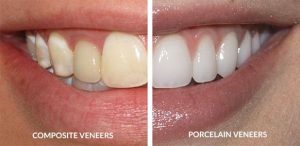COMPOSITE OR PORCELAIN VENEERS?
We often see patients who want to improve the appearance of their teeth. This may be due to discolouration, irregular shape, overlapping or spacing between the teeth.
Wherever possible we recommend most conservative options like whitening and straightening. If this isn’t enough the next step is to consider covering the teeth with facings called veneers. These can be designed in advance and patients can have a trial arranged where they get to see their teeth with ‘veneers’ in place. At this stage we need to decide what type of veneer would be more suitable.
So what are the different types?
Composite veneers
- Done on the spot in one appointment, thus quicker and cheaper in price (similar to a large filling)
- Material used is composite resin, which is also used for standard white dental fillings.
- Colour is selected on the spot by the dentist and can be closely matched to your natural tooth colour to make sure composite veneers blend in with your other teeth.
- In many cases teeth do not need to be filed down, composite material is bonded straight to the tooth’s enamel surface. This means it’s still your natural, healthy tooth underneath.
- Composite veneers can lose their lustre and become stained over time, so need regular maintenance, polishing and top-ups.
- On average last 5-7 years
- If chip or break can be repaired in the mouth by simply adding more composite resin (filling) material
Porcelain veneers
- Done over 2 appointments as they are manufactured by the dental technicians in our local laboratory (similar to a crown).
- 2-3 weeks wait with temporary plastic veneers/coverings in place.
- Tooth’s enamel surface has to be filed back to make space for porcelain veneer. Once enamel is cut it is forever, meaning slightly higher chance of further dental work needing to be done to the tooth in the future.
- Colour can be matched precisely by your dentist and technician, meaning extremely natural result
- Porcelain doesn’t lose its gloss and colour, so less ongoing maintenance required (other than good oral hygiene, regular cleaning and check-ups)
- On average last 10-15 years
- If chip or break have to be remade from scratch by the lab as any repair is only temporary
Interested to find out more about your options and what’s more appropriate in your case? Don’t hesitate to contact us on 9531 6387 or info@elwooddental.com.au and one of our dentists would be happy to help!


